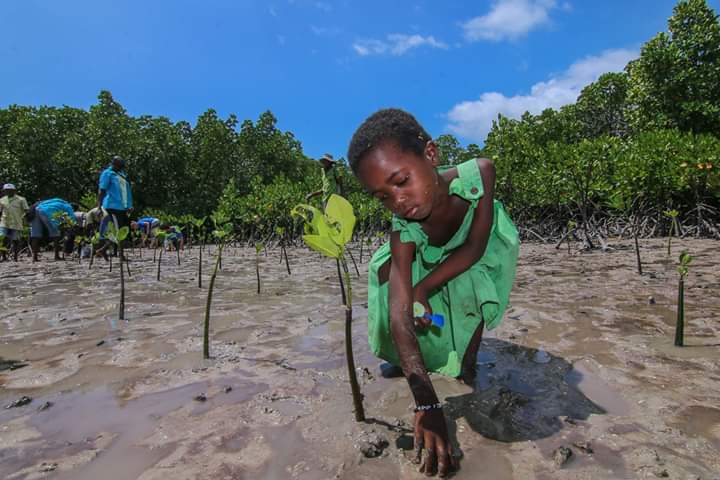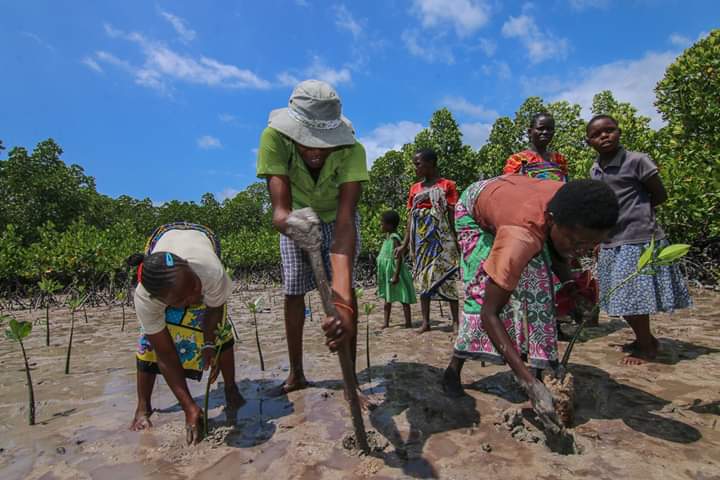Tree planting for food security and environment restoration
Fundraising campaign by
Willis Orum
-
US$75.00raised of $1,850.00 goal goal
No more donations are being accepted at this time. Please contact the campaign owner if you would like to discuss further funding opportunities
Campaign Story
YOUTHS TREE PLANTING FOR ENVIRONMENT RESTORATION AND FOOD SECURITY PROJECT PROPOSAL
1. GENERAL INFORMATION
Organization Name: Little Hands On Permaculture.
Responsible Party
Name: Willis Ochieng Orum
Tel: +254 710 254 259
Email: [email protected]
Project Contact:
Phone: +254 735 523 536
WhatsApp: +254 710 254 259
P.O.Box 112 40305 Mbita Kenya
Project Name: YOUTHS TREE PLANTING AND ENVIRONMENT RESTORATION AND FOOD SECURITY
project location: Homabay county / Nairobi county / Mombasa county.
Group's and communities involved: Little Hands On Permaculture orphanage and community members.
Kaswanga primary school students and teachers. Homabay county.
Community groups from Kayole and Mathare slums in Nairobi county.
Likoni AIDS orphanage in Mombasa county.
Timeframe
Start Date: January, 2019.
End Date: PERPETUAL
Fundraising target: $1850
Funds previously raised: $300
Currency: SHILLINGS
CLASSIFICATION:
Environment, Food, Agriculture & Nutrition, Employment, Community Improvement &
Capacity Building.
METHODOLOGY
Forestry and agro-forestry are the most natural and effective ways of controlling climate change.
Trees reduce the carbon footprint. A mature tree consumes up to 48pounds of carbon dioxide a
year. Trees prevent soil erosion by slowing down and absorbing the rain water. Also with the
constantly rising temperatures and new heat records being set every coming year, trees cool the
earth through evaporation. Therefore because trees are much cheaper compared other methods of
climate change mitigation, it is easy for the locals to invest in them and so far, we have registered
a lot of success.
ACTIVITIES AND OUTPUTS
1. Climate change education: We impart climate change knowledge and information to
students through school clubs, orphanages and local communities through
village meetings with the locals and local leaders.
2. Forestry: We practice reforestation and afforestation by creating model forests and so far
we plan to plant overs 2M trees. Plant fruit trees in schools for their nutritional value.
3. Agro-forestry: Encourage local communities continue with agriculture on the same land with
the trees to ensure continued food production.
4. Value chain addition: For purposes of adding value to the locals’ agricultural produce
enabling them to preserve and increase the economic value of their food.
PROJECT PERSONNEL: Our team includes; an Executive Director, Secretary general, head
of Finance, Public relations, IT team, Social workers/volunteers, Schoo/orphanagee Patron's and School club
leaders/cabinet who include; a president, a vice president, a general secretary, a treasurer and
class representatives.
Intellectual property and other regulatory compliance: Little Hands On Permaculture is a
CBO, whose activities in the district have been endorsed by both the Local Government and the
Municipal Council (formerly the Town Council).
2. PROJECT SUMMARY – ABSTRACT
Over the past decade, there has been a drastic change in the climatic patterns, increased
temperatures, a 50% rise in severity of droughts and floods. People’s standards of living have
dropped substantially due to the reduced agricultural yield. Today, two thirds of the Teso
population is living below the poverty line and yet the population continues to grow at an
average of 5.1 percent which is far much higher than the national growth rate of about 3.3
percent. In fact many families survive on one meal a day.
These conditions have been sparked off by activities like deforestation for building, charcoal,
firewood and burning bricks. Little Hands On Permaculture seeks to equip the populace, especially the youth and
grassroots community, with knowledge and hands on skills on how to combat climatic changes.
GOAL
To instill a culture of environmental protection amongst the citizens and revitalize Kenya to a
state where the populace has sufficient knowledge to mitigate and adapt to climate change effects
in time.
3. THE PROJECT
OBJECTIVES:
To educate and increase public awareness on climate change and environmental protection.
To cultivate a culture of conserving and protecting the environment
To inspire, mobilize and train other citizens to plant trees using professional standards
Mitigate climate change effects through forestry, agro-forestry and value chain addition.
Alleviate poverty through agro-forestry, employment and value change addition.
HOW THE PROJECT IS UNDERTAKEN
1. Climate change education is undertaken by creating clubs in communities, schools and orphanages
which act as a channel to disseminate information.
2. The forestry project is implemented by sensitizing locals on climate change and
encouraging those with excess land to plant trees on it. An agreement is entered between Little Hands On Permaculture and the land owner that no tree shall be cut down before at least 15years elapse. All
agreements are registered at the registry of documents to ensure they are legally binding. There
shall be a 50% share benefit for each party, Little Hands On Permaculture using hers to propagate the project.
However, the trees planted in schools shall not be cut down.
3. Agro-forestry is to ensure continued productivity of food as agriculture is the backbone of the
Kenyan economy with more than 78% of the people deriving their livelihood from it directly or
indirectly. With the trees taking 15years before any harvest, farmers cannot be deprived of their
land for agriculture. Also after 3 years, when farming can no longer be practiced on the same
land as the forests, goats and chicken (animal husbandry) will be introduced on the same land
thus ensuring maximum utilization of resources.
4. Value-chain addition includes adding value to any product thereby enabling the producers to
derive more economically from any product they produce.
prone to droughts and sometimes floods, we believe it pertinent that locals preserve and add
value to their foods. This will enable them keep their foods for longer, sell them off at a
relatively higher price and also enable them regulate the market especially during peak seasons.
STATUS OF THE PROJECT: Little Hands On Permaculture Initiative is currently an ongoing project.
COMMUNITY AND VOLUNTEER INVOLVEMENT: Students orphaned children and the local communities
are the backbone of the project and they actively participate in all the projects activities.
ORGANIZATION’S QUALIFICATIONS TO CARRY OUT THE PROJECT
The organization is currently registered as a community based organization (CBO)
HOW WILL THE PROJECT BE EVALUATED?
Through the actual survival of the forests. The number of trees planted is noted and
compared against the surviving number every year.
The number of youth actively participating and using the skills taught to them by our
technical team will be a yard stick of measure of our progress.
The number of functional school clubs that we create in schools
Positive change in people’s attitude towards environmental protection and tree planting.
PLANS FOR CONTINUED FUNDING OF THE PROJECT
We intend to become self-sustaining through the sale of tree seedlings and flowers to private
projects, taking on other “tree planting” contracts from government and other organizations.
Location of different activities: Little Hands On Permaculture activities will be located in various communities, orphanages
and schools both primary and secondary within the three counties. We do intend to
expand to other regions.
Duration of the project (starting and ending dates): Little Hands On Permaculture Initiative is intended to be a
perpetual project because fighting climate change is a continuous struggle.
SCHEDULE OF ACTIVITIES (all year round)
January – February: opening new clubs in new schools and sensitizing communities while
securing land for model forests
March- June: preparation of seedling nursery- equipping students and communities with
tree planting skills by scheduling regular visits to the nursery during this time.
Late June – September: agriculture and tree planting season begins in different schools and
communities.
All through the year: weekly school club meetings, monthly meetings with various
communities, forest and school visits and inspections.
We also intend to introduce Little Hands On Permaculture Christmas parties to celebrate every year’s achievements
and recognize the most active members and stuff as a way of motivation.
BUDGET
ITEM BREAK DOWN One-time costs Recurring costs
TREE
NURSERY
1. Land... Available land on project site.
2. Fencing...... Pole 11,500/=
Cement 1,400/=
Gravel 1000/=
Barbed wire roll 4,500/=
Lockable gate 3,000/=
Total for one site 21,400/=
Total for 3 sites 64,200/
3. Water source...... 1000ltrs tank 7,000/=
Total for 3 sites 21,000/=
4. Tree seeds..... Locally picked by the community and the children.
7. labor...... 20,000/=
Volunteers
allowance
1. Transport
2. Food.......15,000/=
Educational
programs
1. Conferences/meeting
s/trainings with the local community groups and forest authorities...... 47,000/=
2. Books.... 15,950/=
Grand total 183,150/=
$1850/= exchange rate of ksh 99.00
INFRASTRUCTURE: this will be constituted by a tree nursery, a water source and an Office.
PLANNED IMPACTS AND ADOPTION PATHWAYS
Mitigation of floods and droughts
Cooling of the environment through evaporation which reduces temperatures.
Eradication of indiscriminate deforestation
Curbing soil erosion
Improved agricultural harvest from improved soil fertility
Wider source of income through animal husbandry, farming, value addition and forestry
Controlled market through value chain addition
Creation of employment opportunities
Acquisition of climate change knowledge
Adaptation of a tree planting culture
Improved standard of living
END USERS OF THE PROJECT RESULTS: The entire community as a whole.
PROPOSED COMMUNICATION ACTIVITIES: through Orphanage and School clubs, Community
meetings, seminars, social media and when need arises radio and television.
Fundraising Team
- Willis Orum
- Campaign Owner
- Mbita, KE
Permaculture practitioner Regenerative agriculture practitioner founder Regenerative Holistic Resource Center Kenya
Permaculture practitioner Regenerative agriculture practitioner founder Regenerative Holistic Resource Center Kenya
- Ryan Greene
- Social media manager and funding captain
Donors
- Alex Klomp
- Donated on Jan 03, 2019
- Anonymous
- Donated on Dec 28, 2018
- Willis Orum
- Posted On Dec 21, 2018
Thank you so very much for standing with our life time dream to change what we can to improve our environment for our children.
No updates for this campaign just yet
Donors & Comments
- Alex Klomp
- Donated on Jan 03, 2019
- Anonymous
- Donated on Dec 28, 2018
- Willis Orum
- Posted On Dec 21, 2018
Thank you so very much for standing with our life time dream to change what we can to improve our environment for our children.
- Guest
- Donated on Dec 20, 2018




